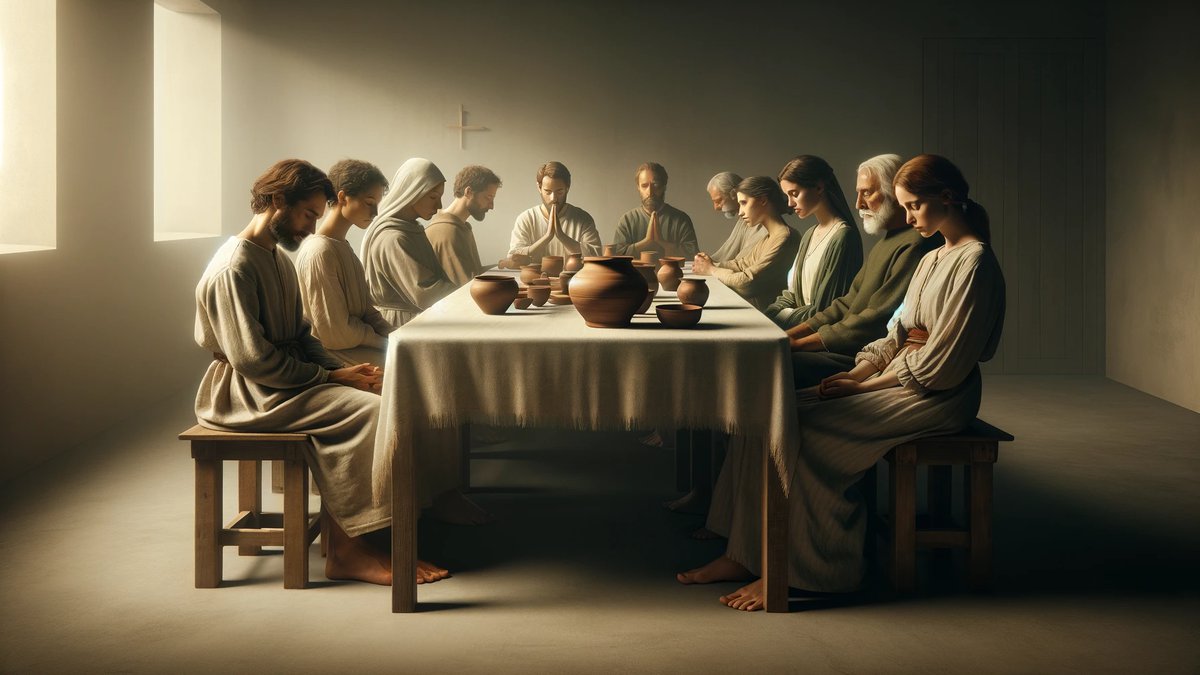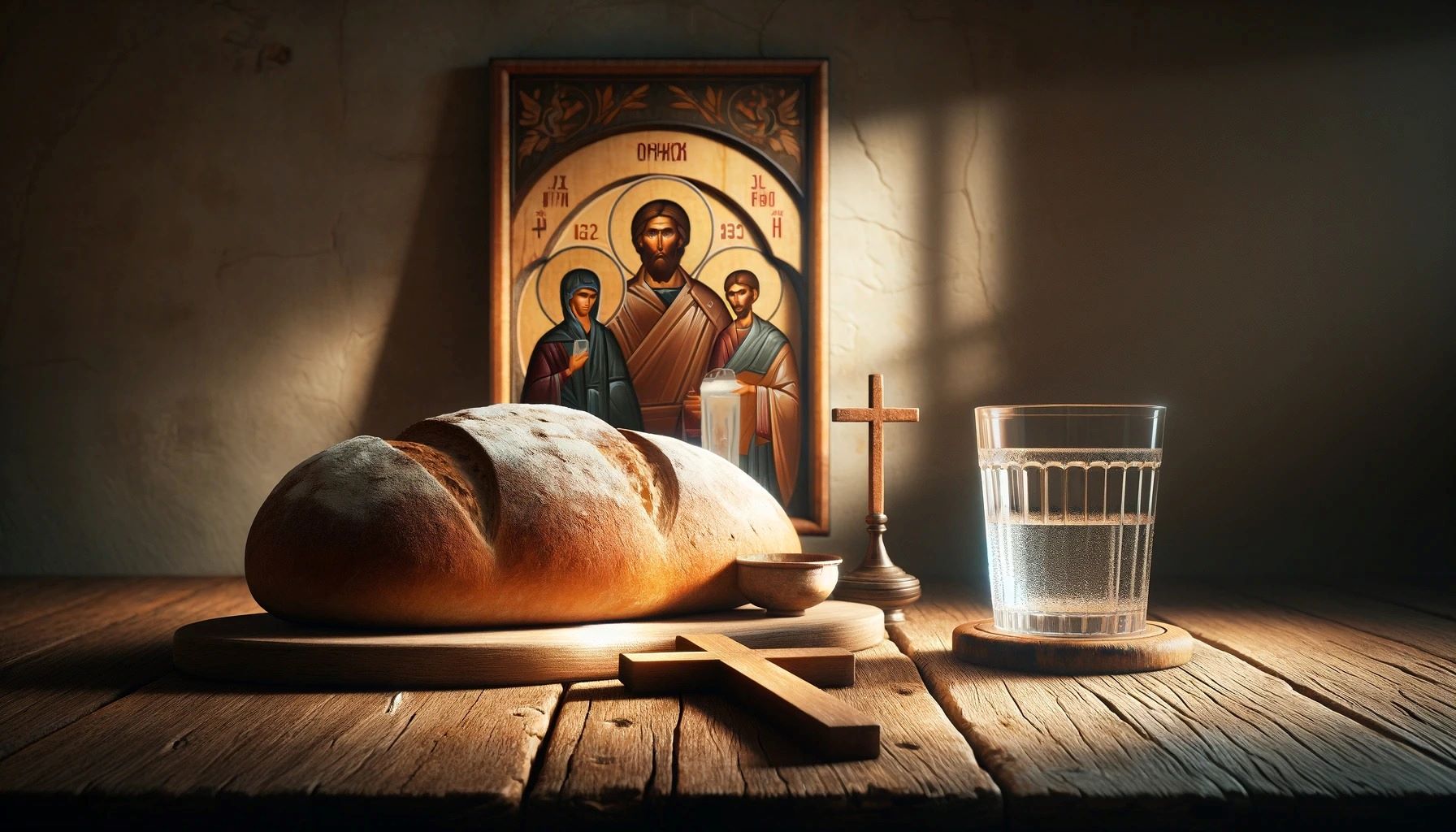Home>Special Themes>What Day Do You Fast During Lent


Special Themes
What Day Do You Fast During Lent
Published: February 28, 2024
Ericka Andersen, an editor at Christian.net, expertly merges digital strategy with content creation, focusing on faith and societal issues. Her communication skills enhance the platform's engaging narratives, fostering meaningful dialogue on belief's impact on society.
Discover the significance of fasting during Lent and learn about the special themes associated with this religious observance. Explore the traditions and practices of Lenten fasting.
(Many of the links in this article redirect to a specific reviewed product. Your purchase of these products through affiliate links helps to generate commission for Christian.net, at no extra cost. Learn more)
Table of Contents
The Significance of Lent in the Christian Faith
Lent holds great significance in the Christian faith as it is a period of spiritual preparation, self-reflection, and repentance. It commemorates the 40 days that Jesus spent fasting in the wilderness, enduring temptation by Satan. For Christians, Lent is a time to imitate Jesus' withdrawal into the desert and to reflect on their own lives, seeking to grow closer to God. It is a season of self-discipline, where believers are encouraged to engage in acts of prayer, fasting, and almsgiving. Through these practices, Christians seek to purify their hearts and minds, and to realign their focus on their relationship with God and their fellow human beings. Lent culminates in the celebration of Easter, marking the resurrection of Jesus Christ, and is therefore a period of both solemnity and joyful anticipation for believers.
-
Spiritual Preparation: Lent provides an opportunity for Christians to spiritually prepare for the commemoration of Jesus' death and resurrection. It is a time for believers to examine their lives, repent of their sins, and renew their commitment to living in accordance with the teachings of Jesus.
-
Self-Reflection and Repentance: During Lent, Christians engage in introspection, acknowledging their shortcomings and seeking forgiveness. This period of self-reflection allows individuals to confront their imperfections and strive for spiritual growth.
-
Imitating Jesus' Example: By observing Lent, Christians seek to follow the example of Jesus, who spent 40 days in the wilderness, fasting and resisting temptation. This imitation of Christ's actions serves as a means of drawing closer to God and deepening one's faith.
-
Self-Discipline and Spiritual Growth: Through the practices of prayer, fasting, and almsgiving, believers exercise self-discipline and focus on nurturing their spiritual lives. These acts of devotion are intended to foster personal growth and a deeper connection with God.
In essence, Lent holds a profound significance in the Christian faith, serving as a period of spiritual renewal, self-examination, and preparation for the celebration of Easter. It is a time for believers to recommit themselves to their faith and to seek a closer relationship with God.
Read more: How Do Catholics Fast During Lent?
Historical Origins of Fasting During Lent
-
Early Christian Practices: The tradition of fasting during Lent has its roots in the early Christian church. In the first few centuries of Christianity, new believers underwent a period of intense preparation before their baptism, which often included fasting. Over time, this practice evolved into a season of fasting for the entire Christian community, leading up to the celebration of Easter.
-
Biblical Precedent: The concept of fasting as a spiritual discipline has deep biblical roots. In the Old Testament, fasting was often associated with mourning, repentance, and seeking God's guidance. For example, Moses, Elijah, and King David all engaged in fasting as a means of drawing closer to God. In the New Testament, Jesus Himself fasted for 40 days in the wilderness, setting a powerful example for His followers.
-
40 Days of Preparation: The duration of Lent, which spans approximately 40 days, is symbolic of several significant periods in the Bible. It mirrors the 40 days that Jesus spent fasting in the wilderness, as well as the 40 years that the Israelites wandered in the desert. This period of preparation and self-denial is intended to mirror these biblical events and to prepare believers for the celebration of Easter.
-
Penitential Season: As the early church developed a liturgical calendar, Lent emerged as a penitential season, during which believers were called to repent of their sins and turn back to God. Fasting became a central aspect of this penitential discipline, serving as a physical expression of spiritual devotion and a means of focusing on prayer and self-examination.
-
Evolution of Fasting Practices: The specific rules and practices surrounding fasting during Lent have evolved over the centuries, with different Christian traditions adopting varying approaches. However, the historical origins of fasting during Lent are deeply rooted in the early Christian church and the biblical precedent of fasting as a means of spiritual preparation and devotion.
Different Fasting Practices in Various Christian Denominations
-
Roman Catholicism: In the Roman Catholic tradition, Lenten fasting involves abstaining from meat on Ash Wednesday, Good Friday, and all Fridays during Lent. Additionally, Catholics are called to observe a fast on Ash Wednesday and Good Friday, consuming only one full meal and two smaller meals that do not add up to a full meal. This practice of fasting and abstinence is seen as a way to participate in the sacrificial nature of Jesus' journey to the cross.
-
Eastern Orthodox Church: The fasting practices in the Eastern Orthodox Church are particularly rigorous. Orthodox Christians abstain from meat, dairy, fish, olive oil, and wine throughout the entirety of Lent. This strict fasting regimen is observed on weekdays, with some relaxation of the rules on weekends. The Lenten fast in the Eastern Orthodox tradition is seen as a period of spiritual discipline and purification, with a focus on prayer, repentance, and almsgiving.
-
Protestant Traditions: Fasting practices during Lent vary among Protestant denominations. Some Protestant churches encourage individual believers to choose their own fasting practices, such as giving up a particular food or habit for the duration of Lent. Others may emphasize the spiritual disciplines of prayer and meditation without prescribing specific dietary restrictions. While Protestant traditions may not have uniform fasting guidelines, the emphasis is often on the inward spiritual journey and drawing closer to God during the Lenten season.
-
Anglican Communion: Within the Anglican tradition, fasting during Lent is often characterized by abstaining from certain types of food, particularly meat, on Ash Wednesday and Good Friday. However, the specific fasting practices may vary among different Anglican churches and individual members. The Anglican Communion places a strong emphasis on the spiritual significance of fasting as a means of self-discipline and spiritual growth.
-
Lutheran Church: In the Lutheran tradition, fasting during Lent is not as strictly defined as in some other denominations. While some Lutherans may choose to observe traditional fasting practices, such as abstaining from meat on Ash Wednesday and Good Friday, the emphasis is often on the individual's personal spiritual journey. Lutherans may engage in various forms of fasting and self-denial as a way to focus on their relationship with God and their neighbors during Lent.
-
Methodist Church: Methodists approach fasting during Lent as a means of deepening their spiritual lives and drawing closer to God. While there are no strict rules regarding fasting, many Methodists choose to give up certain foods or activities as a form of self-discipline and spiritual devotion. The Methodist tradition emphasizes the importance of prayer, self-examination, and acts of mercy during the Lenten season.
In summary, the diverse fasting practices in various Christian denominations reflect the rich tapestry of traditions and beliefs within the broader Christian faith. While the specific guidelines for fasting may vary, the underlying purpose remains consistent: to engage in acts of self-discipline, spiritual reflection, and devotion during the Lenten season.
The Day of the Week for Fasting During Lent
-
Ash Wednesday: Ash Wednesday marks the beginning of Lent and is a significant day for fasting and abstinence in the Christian calendar. It is customary for believers to fast on Ash Wednesday, refraining from consuming meat and engaging in a spirit of penitence and self-denial. This day sets the tone for the Lenten season, serving as a solemn reminder of human mortality and the need for repentance.
-
Good Friday: Good Friday, the day that commemorates the crucifixion of Jesus Christ, is another key day for fasting during Lent. In many Christian traditions, believers observe a strict fast on Good Friday, abstaining from food and drink for a significant portion of the day. This fast is a way of participating in the sorrow and sacrifice of Jesus' death on the cross, as well as a means of preparing for the celebration of His resurrection on Easter Sunday.
-
All Fridays During Lent: Across various Christian denominations, Fridays during Lent hold special significance for fasting. It is common for believers to abstain from meat on these days, as a way of honoring the sacrifice of Jesus and expressing solidarity with His suffering. Additionally, some traditions encourage fasting from other types of food or engaging in acts of self-denial on Fridays, as a way of deepening one's spiritual journey during Lent.
-
Personal Choice and Devotion: While specific days such as Ash Wednesday and Good Friday are traditionally designated for fasting, many Christians also have the freedom to choose additional days for fasting during Lent based on their personal convictions and spiritual goals. Some individuals may opt to fast on Wednesdays as a way of marking the midpoint of the week and seeking spiritual renewal, while others may choose to fast on other significant days in their faith journey.
-
Flexibility and Spiritual Intent: Ultimately, the day of the week for fasting during Lent is a matter of personal discernment and spiritual intent. While certain days hold particular significance within the Christian calendar, the emphasis is on the heart behind the act of fasting. Whether it is a traditional fasting day or a personal choice, the goal is to engage in a period of self-discipline, prayer, and reflection, drawing closer to God and seeking spiritual growth during the Lenten season.
Factors to Consider When Choosing a Fasting Day
When contemplating which day to observe fasting during Lent, several factors come into play, influencing the decision-making process for individuals and communities. These considerations are pivotal in ensuring that the act of fasting aligns with the spiritual goals and personal circumstances of the participants. Here are some key factors to take into account when choosing a fasting day:
-
Tradition and Liturgical Calendar: Many Christians adhere to the traditional fasting days prescribed by their respective denominations and liturgical calendars. These established fasting days, such as Ash Wednesday and Good Friday, hold significant spiritual and communal importance, providing a sense of unity and shared devotion among believers. Adhering to these traditional fasting days can foster a sense of connection to the broader Christian community and the historical practices of the faith.
-
Personal Health and Well-being: It is essential for individuals to consider their physical health and well-being when selecting a fasting day. Some individuals may have medical conditions or dietary requirements that necessitate a modified approach to fasting. Consulting with a healthcare professional or a spiritual advisor can help individuals make informed decisions that prioritize both their spiritual commitments and their physical health.
-
Work and Family Commitments: The practical aspects of daily life, including work and family responsibilities, can impact the choice of a fasting day. Individuals may need to consider their professional obligations, family mealtimes, and social engagements when determining a suitable day for fasting. Finding a balance between spiritual observance and everyday responsibilities is crucial in ensuring that fasting does not unduly disrupt essential aspects of life.
-
Spiritual Intent and Personal Conviction: The underlying spiritual intent and personal conviction play a significant role in the selection of a fasting day. Some individuals may feel called to observe additional days of fasting beyond the traditional ones, driven by a deep sense of spiritual longing or a desire for greater intimacy with God. Others may approach the decision with a focus on specific spiritual goals, such as seeking clarity, repentance, or intercession for others.
-
Community and Support: For many believers, the communal aspect of fasting is vital. Considering the fasting practices of one's faith community and seeking support from fellow believers can influence the choice of a fasting day. Participating in communal fasting efforts can create a sense of solidarity and shared purpose, reinforcing the spiritual significance of the practice.
-
Flexibility and Adaptability: While there are established fasting days within the Christian tradition, there is also room for flexibility and adaptability. Individuals may need to assess their schedules, emotional state, and spiritual readiness when deciding on a fasting day. The ability to adapt the fasting practice to one's unique circumstances can contribute to a more meaningful and sustainable experience.
In essence, the selection of a fasting day during Lent involves a thoughtful consideration of tradition, personal well-being, spiritual conviction, and communal support. By carefully weighing these factors, individuals can embark on a fasting practice that is both spiritually enriching and mindful of their individual needs and circumstances.
Read more: What Are The Rules Of Fasting During Lent
Personal Reflections on Fasting During Lent
Fasting during Lent is a deeply personal and introspective experience for many Christians, prompting profound reflections on faith, self-discipline, and spiritual growth. As individuals engage in the practice of fasting, they often undergo a journey of self-discovery and contemplation, drawing from their experiences to glean valuable insights and lessons. Here are some personal reflections on fasting during Lent that encapsulate the transformative nature of this spiritual discipline:
-
Self-Discipline and Sacrifice: Fasting during Lent serves as a poignant reminder of the importance of self-discipline and sacrifice in the Christian walk. Through the act of abstaining from certain foods or indulgences, individuals confront their own desires and impulses, learning to exercise restraint and prioritize spiritual nourishment over temporal comforts. This process of self-discipline fosters a deeper understanding of the sacrificial nature of faith and the call to deny oneself for the sake of spiritual enrichment.
-
Clarity and Renewal: Many individuals find that fasting during Lent brings a sense of clarity and renewal to their spiritual lives. By temporarily relinquishing certain pleasures, they create space for introspection, prayer, and meditation, allowing them to refocus their attention on their relationship with God. This period of heightened spiritual awareness often leads to a renewed sense of purpose, a clearer perspective on life's priorities, and a deepened connection to one's faith.
-
Empathy and Compassion: Fasting during Lent can cultivate a heightened sense of empathy and compassion for others. As individuals experience moments of hunger or longing during their fast, they become more attuned to the struggles of those who face chronic deprivation or hardship. This newfound empathy inspires acts of kindness, generosity, and service, as individuals seek to alleviate the suffering of others and extend the love and compassion they have received from God.
-
Humility and Dependence on God: The practice of fasting often leads to a profound sense of humility and dependence on God's provision. As individuals confront their physical limitations and vulnerabilities, they are reminded of their reliance on God for sustenance and strength. This humbling experience fosters a spirit of gratitude and trust, as individuals acknowledge their need for divine grace and sustenance in every aspect of their lives.
-
Transformation and Growth: Fasting during Lent is a catalyst for personal transformation and spiritual growth. Through the process of self-denial and introspection, individuals undergo a period of refinement, shedding unhealthy habits, attitudes, and distractions. This transformative journey equips them to embrace a renewed sense of purpose, a deeper intimacy with God, and a heightened awareness of their role in the broader tapestry of humanity.
-
Camaraderie and Community: Many individuals find that fasting during Lent fosters a sense of camaraderie and community within their faith circles. Sharing the experience of fasting with fellow believers creates a bond of solidarity and mutual support, as individuals encourage and uplift one another through the challenges and triumphs of the Lenten season. This communal aspect of fasting enriches the overall experience and reinforces the interconnectedness of the body of Christ.
In essence, personal reflections on fasting during Lent reveal the multifaceted impact of this spiritual practice on individuals' lives. From self-discipline and sacrifice to empathy, humility, and growth, the experience of fasting during Lent transcends mere physical abstinence, offering a profound journey of self-discovery, spiritual renewal, and communal connection.














